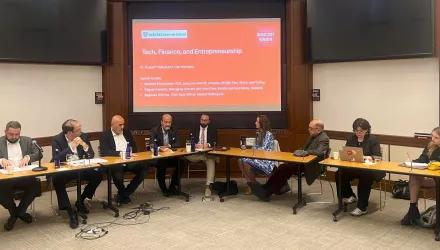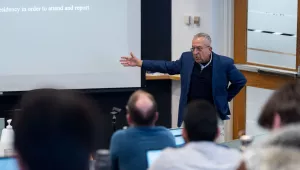
The E3 countries (Germany, France, and the UK) intended to seed the Institution in Support of Trade Exchanges (INSTEX) as a means of supporting trade with Iran after the reimposition of sanctions. Though humanitarian goods, like food and medicine, are technically exempt from Washington’s sanctions, many private sector players are deterred by the combination of a more activist sanctions policy and continuing AML/CFT problems in the Iranian jurisdiction. In the current political environment, a small transfer with a front company or associate could expose a firm to millions in fines and penalties. Initially seed with several millions of euros, INSTEX aims to reduce the role of direct funds transfers, resembling the trust-based hawala networks, popular for Middle Eastern merchants.
In a broader sense, INSTEX’s protection of humanitarian transactions is aimed at ensuring Tehran’s continued participation in the Iran Deal. Still, with INSTEX’s capital a small fraction of pre-sanctions trade volumes and its exclusion of sanctioned goods, like oil, these incentives are sparse. Further, even if INSTEX included oil transactions, many players would be deterred by the potential for INSTEX itself to be sanctioned or by their own sanctions liabilities. In a global financial system dominated by the dollar, there is no clear path for sanctions evasion, except for fraud, manipulation, and deceit.
Even if oil is not included, there are still potential grounds for sanctions that could be cited in the future, should escalation in the Persian Gulf continue. INSTEX’s Iranian counterpart, the Special Trade & Finance Instrument (STFI), could be exposed to sanctions due to its ties to the Central Bank of Iran (CBI). Though connections between the two are distant, CBI has been linked to past cases of terrorism and proliferation financing, both under the first and current round of sanctions. In May 2018, then-Governor Valiollah Seif was sanctioned for the CBI’s role in a Dubai-based money transfer network that supplied funds to the Quds Force. Last November, two CBI officials, Rasul Sajjad and Hossein Yaghoobi, were sanctioned for their role in an illicit scheme to smuggle oil to the Assad regime.
In that same case, Iran made use of a front company, Tadbir Kish Medical & Pharmaceutical Company, to handle transfers to the Russian firms, Global Vision Group and Promsyrioimport. The use of an ostensible humanitarian company in an evasion transaction could put INSTEX in the US Treasury’s sights. This precedent not only affects INSTEX’s future, but also current market participation in the financing vehicle, which may be deterred if future sanctions are interpreted as likely. Unlike past sanctions regimes, the political signals sent by INSTEX’s creation could cause sanctions to carry a higher price tag than past efforts.
Beyond the transatlantic alliance, INSTEX’s creation signaled on a global level that the incentives to evade US sanctions had risen considerably. Under the prior regime, the EU had implemented an oil embargo that was among the most effective sanctions, given that Brussels consumed a considerable amount of Iran’s energy exports. Coupled with this embargo, the diplomatic use of waivers, allowing some states to continue importing Iranian oil, but at reduced levels, bought the support of China and India, among other major consumers. While the waivers have expired, INSTEX’s creation signaled that Brussels had an active interest in providing measured economic benefits to Tehran, a sharp rebuke of sanctions. If INSTEX were to be sanctioned, key dollar transactions at the margin may be vulnerable to switching into different currencies. The dollar’s role in the international economy is guaranteed by extraneous factors, like the strength of institutions like the Federal Reserve or the liquidity of the Treasuries market. But for malign actors seeking to pass transactions, INSTEX’s structure may be attractive, and there can be balances to its weaknesses.
While Iran may be a small economy, with little tangible economic cost to sanctions, larger great powers, like Russia, China, or even the EU, could have much more collateral effects if sanctioned. Some actors in these economies may even be classified as “sanctions-proof”: the political and economic costs of sanctions would be so high that it would be incomprehensible for Washington to target them.
Central banks, sovereign wealth funds, and even large, state-owned banks could be key actors in these future evasion schemes. If INSTEX were expanded in its current form to include oil transactions, Washington could not only sanction INSTEX itself, but also INSTEX’s customers. In a hypothetical, if those customers were large entities, like the People’s Bank of China, sanctions might be unfeasible, either due to political or economic costs. Unlike the CBI, the People’s Bank is one of the largest forex reserve holders in the world, much of it concentrated in dollar-denominated Treasuries. Such an action could not only affect reserve managers’ use of the Treasuries market, but also trigger significant instability in the Chinese banking market and the value of the RMB. Given China’s significant contribution to global growth and multinationals’ profits, such a move could precipitate an international financial crisis.
At a lower level, even in a small jurisdiction, like Turkey, the potential for evasion is higher. Turkey, already signaling interest in developing an INSTEX-like mechanism, has a mixed record on sanctions enforcement. During the prior round of sanctions, Turkish imports of Iranian gas, paid for in liras, were reportedly spent on large sums of Turkish gold, exported to Tehran indirectly via Dubai. More recently, in March, a cross-border network sanctioned for procuring hard currency for the IRGC included several Turkish actors. Turkey-based Suleyman Sakan and Ali Shams Musavi both collaborated with UAE-based exchanges to acquire millions in dollars and dollar banknotes for the IRGC.
Whether through intentionally deceptive front companies or sanctions resistant central banks, similar structures to INSTEX are likely in the future. Should INSTEX itself be sanctioned, it would be a powerful signal to the rest of the world. In this scenario, critical dollar-denominated trade not currently facing sanctions, but at potential risk of being sanctioned in the future, could migrate to third party currencies, transferred through sanctions-resistant entities to an INSTEX-like body. This may be the ultimate lesson that INSTEX teaches to Washington’s policymakers: the symbolic response to the overuse of the dollar may carry tangible costs.
Statements and views expressed in this commentary are solely those of the author and do not imply endorsement by Harvard University, Harvard Kennedy School, or the Belfer Center for Science and International Affairs.
Michael B. Greenwald is a fellow at Harvard Kennedy School's Belfer Center for Science and International Affairs. He is also a senior adviser to Atlantic Council President and Chief Executive Officer Frederick Kempe and an adjunct professor at Boston University. From 2015-2017, Greenwald served as the US Treasury attaché to Qatar and Kuwait.
Greenwald, Michael. “The Consequences of Weaponizing the U.S. Dollar.” Belfer Center for Science and International Affairs, July 22, 2019




